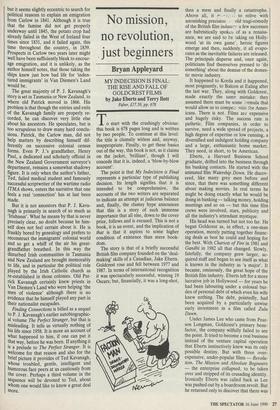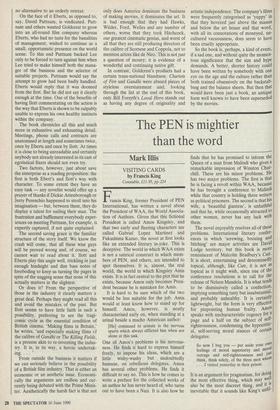No mission, no revolution, just beginners
Bryan Appleyard
MY INDECISION IS FINAL: THE RISE AND FALL OF GOLDCREST FILMS by Jake Eberts and Terry Ilott Faber, £17.50, pp. 678 To start with the crushingly obvious: this book is 678 pages long and is written by two people. To continue at this level: the title is clumsily witless and, anyway, inappropriate. Finally, to get these basics out of the way, this book is not, as it claims on the jacket, 'brilliant', though I will concede that it is, indeed, a `blow-by-blow account'.
The point is that My Indecision is Final represents a particular type of publishing decision. Its length signifies that it is intended to be comprehensive, the accounts of the two writers are separated to indicate an attempt at judicious balance and, finally, the clumsy hype announces that this is a story of such immense importance that all else, down to the cover price, follows and is excused. This is not a book, it is an event, and the implication of that is that it aspires to some higher condition of existence than mere book- dom.
The story is that of a briefly successful British film company founded on the 'deal- making' skills of a Canadian, Jake Eberts. Goldcrest rose and fell between 1977 and 1987. In terms of international recognition it was spectacularly successful, winning 19 Oscars; but, financially, it was a long-shot, then a mess and finally a catastrophe. Above all, it r • -1, .; to relive with astonishing precision • old tragi-comedy of the British film industry: a few successes are hubristically spoked of as a renaiss- ance, we are said to be taking on Holly- wood 'at its own game', heroic figures emerge and then, suddenly, it all evapo- rates as the inevitable failures are released. The principals disperse and, once again, politicians find themselves pressed to 'do something' about the demise of the domes- tic movie industry.
It happened to Korda and it happened, most poignantly, to Balcon at Ealing after the last war. They, along with Goldcrest, made exactly the same mistake: they assumed there must be some :•)rmula that would allow us to compe;.e with the Amer- icans. There is not. Films are expensive and hugely risky. The success rate is pathetic. Film companies, in order to survive, need a wide spread of projects, a high degree of expertise or low cunning, a diversified and indulgent holding company and a large, enthusiastic home market. They need, in short, to be American.
Eberts, a Harvard Business School graduate, drifted into the business through his banking contacts. He started with the animated film Watership Down. He discov- ered, like many grey men before and since, that there was something different about making movies. In real terms he might be doing exactly what he would be doing in banking — talking money, holding meetings and so on — but this time film crews were involved, stars, publicity and all the industry's attendant mystique.
His head was turned but not too far. He began Goldcrest as, in effect, a one-man operation, merely putting together financ- ing deals as best he could and hoping for the best. With Chariots of Fire in 1981 and Gandhi in 1982 all that changed. Slowly, fatefully, the company grew larger, ac- quired staff and began to see itself as what is known in the industry as 'a major'. It became, ominously, the great hope of the British film industry. Eberts left for a more lucrative job in Hollywood — for years he had been labouring under a colossal bur- den of personal debt of which even his wife knew nothing. The debt, pointedly, had been acquired by a particularly unwise early investment in a film called Zulu Dawn.
Under James Lee who came from Pear- son Longman, Goldcrest's primary bene- factor, the company wilfully failed to see the point. It tried to become a real business instead of the venture capital operation that Eberts instinctively knew was its only possible destiny. But with three over- expensive, under-popular films — Revolu- tion, The Mission and Absolute Beginners — the enterprise collapsed, to be taken over and stripped of its crusading identity. Ironically Eberts was called back as Lee was pushed out by a boardroom revolt. But he returned only to discover that there was
no alternative to an orderly retreat.
On the face of it Eberts, as opposed to, say, David Puttnam, is vindicated. Putt- nam and others wanted Goldcrest to grow into an all-round film company whereas Eberts, who had no taste for the banalities of management, wished to continue as a small, opportunistic presence on the world scene. To this end Puttnam backed Lee only to be forced to turn against him when Lee tried to make himself both the mana- ger of the business and the selector of suitable projects. Puttnam would say the attempt to grow had been badly handled. Eberts would reply that it was doomed from the first. But he did not say it clearly enough at the time. One of the benefits of having Ilott commentating on the action is the way that Eberts is shown to be culpably unable to express his own healthy instincts within the company.
The book chronicles all this and much more in exhaustive and exhausting detail. Meetings, phone calls and contracts are anatomised at length and sometimes twice, once by Eberts and once by Ilott. At times it is close to being unreadable and certainly anybody not already interested in its cast of egotistical fixers should not even try.
Two factors, however, just about save the enterprise as a reading proposition: the first is both Ebert's and Ilott's way with character. To some extent they have an easy task — any novelist would offer up a prayer of thanks if Dickie Attenborough or Jerry Perenchio happened to stroll into his imagination — but, between them, they do display a talent for nailing their man. The frustration and bafflement everybody exper- iences on meeting Puttnam, for example, is expertly captured, if not quite explained.
The second saving grace is the familiar structure of the story itself. We know the crash will come, that all these wise guys will be proved wrong and, of course, we cannot wait to read about it. Ilott and Eberts play this angle well, trickling in just enough hindsight and dim bass notes of foreboding to keep us turning the pages in spite of the nagging sense that none of this actually matters in the slightest.
Or does it? From the perspective of those in the industry it clearly matters a great deal. Perhaps they might read all this and avoid the mistakes of the past. But Ilott seems to have little faith in such a possibility, preferring to see the tragi- comic cycle as the essential condition of British cinema. 'Making films in Britain,' he writes, 'and especially making films of the calibre of Gandhi or The Killing Fields, is a process akin to re-inventing the indus- try. It is, in its way, a heroic undertak- ing. . .
From outside the business it matters if we can seriously believe in the possibility of a British film industry. That is either an economic or an aesthetic issue. Economi- cally the arguments are endless and cur- rently being debated with the Prime Minis- ter. Aesthetically the harsh fact is that not
only does America dominate the business of making movies, it dominates the art. It is bad enough that they had Hawks, Wilder, Ford, Welles and any number of others, worse that they took Hitchcock, our greatest cinematic genius, and worst of all that they are still producing directors of the calibre of Scorsese and Coppola, not to mention actors like de Niro. This is not just a question of money; it is evidence of a wonderful and continuing native gift.
In contrast, Goldcrest's products had a certain trans-national blandness. Chariots of Fire and Gandhi were absurd pieces of styleless overstatement and, looking through the list at the end of this book, only Bill Forsyth's Local Hero stands out as having any degree of originality and
artistic independence. The company's films were frequently categorised as `yuppy' in that they hovered just above the masses and below the art house and that word, with all its connotations of moneyed, un- cultured vacuousness, does seem to have been cruelly appropriate.
So the book is, perhaps, a kind of event, if a sad one, and without quite the momen- tous significance that the size and hype demands. A better, shorter history could have been written by somebody with one eye on the age and the culture rather than both trained obsessively on the backstab- bing and the balance sheets. But then that would have been just a book, an antique form well known to have been superseded by the movies.



















































 Previous page
Previous page